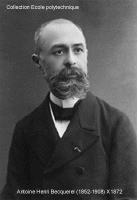Becquerel, Antoine Henri
Antoine Henri Becquerel (1852-1908), French physicist noted for discovering the phenomenon of natural radioactivity. Following Röntgen’s discovery of the X-ray in 1895, Becquerel began to investigate whether there was any relationship between X-rays and naturally-occurring phosphorescence. In 1896, Becquerel exposed uranium salts to sunlight and placed them on photographic plates wrapped in black paper. When developed, the plates revealed an image of the uranium crystals. These results meant that the uranium had emitted radiation without an external source of energy, such as the sun. Later, Becquerel showed that the rays emitted by uranium caused gases to ionize and that they differed from X-rays in that they could be deflected by electric or magnetic fields. For his discovery of spontaneous radioactivity, Becquerel was awarded half of the Nobel Prize for Physics in 1903, the other half being given to Pierre and Marie Curie for their study of Becquerel radiation. The becquerel (symbol Bq') is the SI derived unit of radioactivity in the International System of Units (SI), and equal to one disintegration or nuclear transformation per second.
Further Reading
